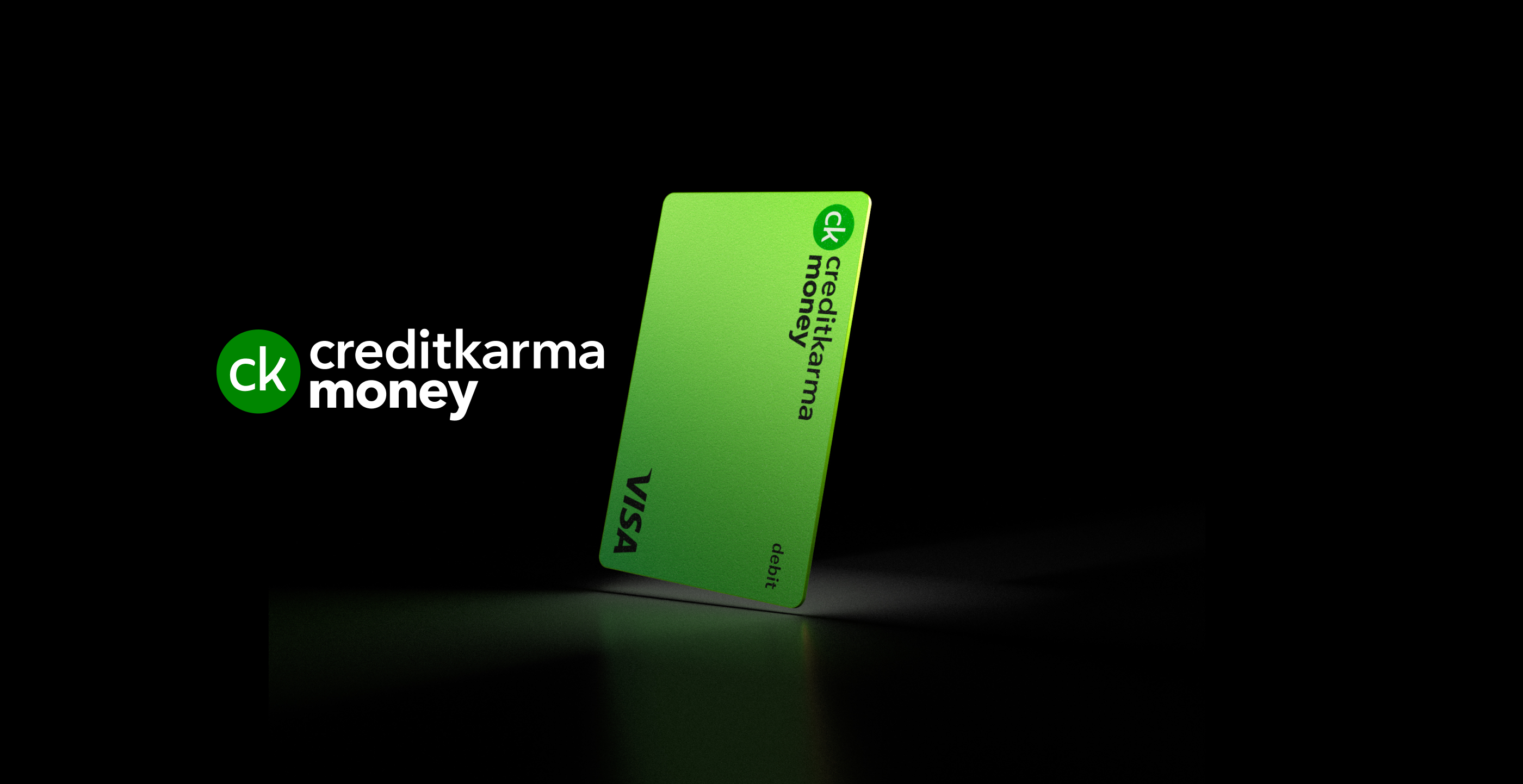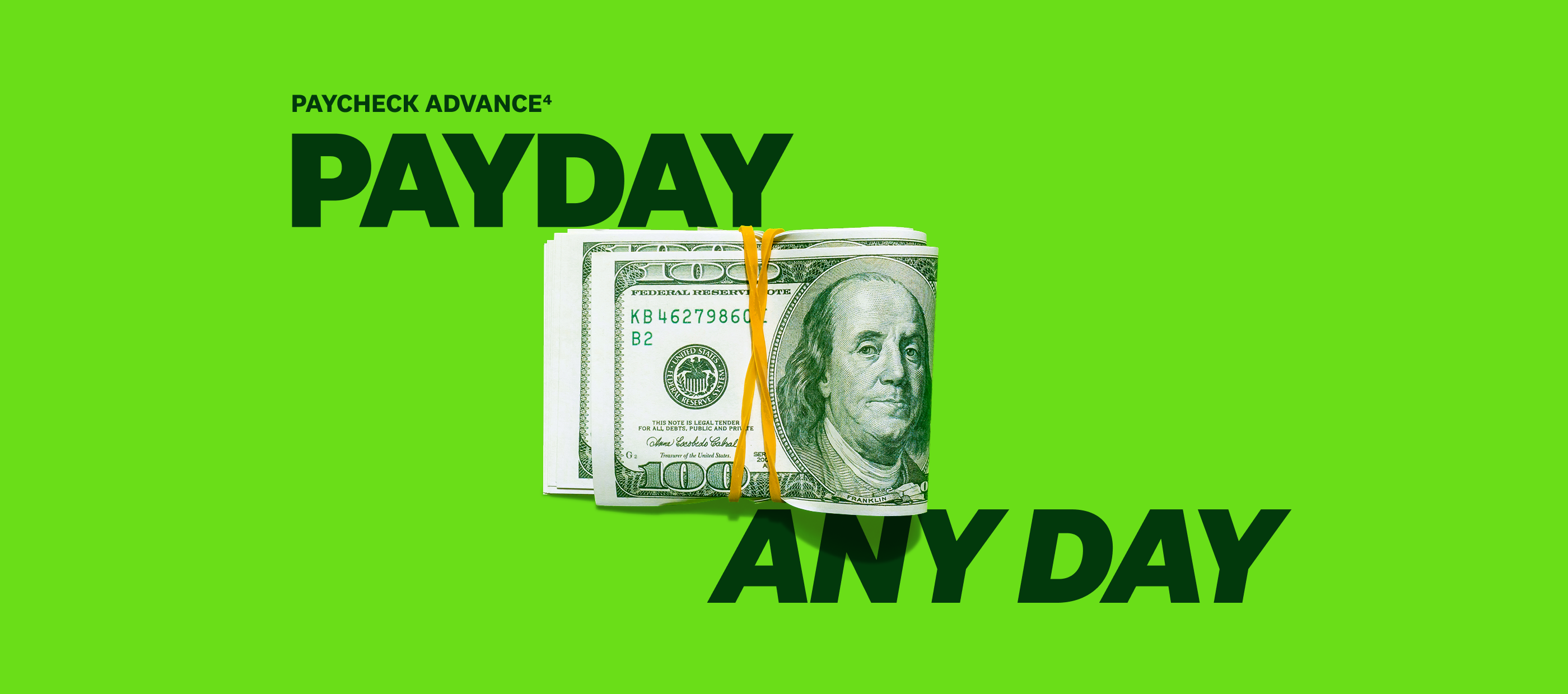
LIVE THE
MONEY LIFE
Get your money faster and take it further.
No monthly fees, no hidden charges, no gotchas.

YOUR MONEY AT YOUR SPEED
GET UP TO
$500 BEFORE PAYDAY*
OVERDRAFT COVERAGE1
UP TO $200* ^
GET PAID UP TO
2 DAYS EARLY2
*Available with a Qualifying Direct Deposit3 of $200 or more.
^Overdraft coverage starts at $20 and can build up to $200 for eligible members.

Access up to $500 before payday with no credit check, interest, or late fees.
Check State Availability4

FEE-FREE BANKING**
NO
MONTHLY FEES.
NO
MINIMUM BALANCES.
NO
FEES AT 55K+ ATMS5.
Credit Karma is not a Bank. Banking services provided by MVB Bank, Inc., Member FDIC.

CREDIT BUILDER6 FROM
CREDIT KARMA MONEY™
LEVEL
UP & UP
Build credit and savings at the same time. Raise a low score by an average of 17 points in 3 days7.
GROW YOUR SAVINGS
 Image: Circle + Icon@2x
Image: Circle + Icon@2xEarn a 2.60% Annual Percentage Yield (APY)8 with Credit Karma Money™ Save—6x the national average.
24/7
SUPPORT
 Image: Circle + Icon@2x-1
Image: Circle + Icon@2x-1Get help via phone, email or our app, or check out the Help Center.
MORE CASH CONTROL
 Image: Circle + Icon@2x-2
Image: Circle + Icon@2x-2Track your spending, dispute transactions and lock your card in the app.
FDIC
INSURED
 Image: Circle + Icon@2x-3
Image: Circle + Icon@2x-3Your funds are FDIC-insured up to $5M9 through a network of banks.
55K+ FREE ATMS5
 Image: Circle + Icon@2x-4
Image: Circle + Icon@2x-4Get free withdrawals at places like Walgreens®, CVS®, 7-Eleven®, and more.
POWER IN NUMBERS
 Image: Circle + Icon@2x-5
Image: Circle + Icon@2x-5Join a community of millions of Credit Karma members.

EYES ON THE PRIZE
Accelerate your progress and start your money life today.
FAQs
A Credit Karma Money Spend account is 100% free to open checking account, with no minimum balance requirements to open. Plus, there are no inactivity fees, no annual fees, and no monthly maintenance fees.
Credit Karma is not a bank. We partner with MVB Bank, Inc., Member FDIC, to provide banking services supporting Credit Karma Money Spend and Credit Karma Money Save accounts.
You can use your Spend account for electronic payments and make everyday transactions with your Credit Karma Visa® Debit Card.10 You can also deposit money from your Credit Karma Money Save account directly through the Money section of your Credit Karma account.
You can open an account in minutes if you are at least 18, have a valid Social Security number, and live in the United States. You will need to provide your SSN, email address, and home address. After your information is verified, your account is ready.
If you already use Credit Karma, you can open a Credit Karma Money Spend account inside the app. Go to the Money tab and follow the prompts.
Additional benefits are provided to members who have set up direct deposit. You’re eligible to receive your paycheck up to 2 days early or federal benefits up to 5 days early.11 Plus with monthly qualifying direct deposits of at least $200 into your Spend account, you’ll also receive additional benefits such as:
– Access to faster transfer times12 – access your money in as little as 1 business day when you transfer into your account
– Get up to $500 before payday with Paycheck Advance. Eligibility requirements apply
– Mobile Check Deposit
– Up to $200 in Overdraft Coverage. Eligibility requirements apply.
Paycheck Advance lets you access up to $500 before payday. There are no mandatory fees, no credit checks, and no interest** to get money when you need it.
Once it’s turned on, you can see how much you’re eligible to advance and transfer it to your Spend account with free standard delivery (within 2 business days) or instant delivery for a $2 fee13
When your qualifying direct deposit arrives, we’ll automatically apply it toward the amount you advanced.
Start by setting up a $200+ Qualified Direct Deposit. You must have received a qualifying direct deposit, and live in a state where Paycheck Advance is offered. Right now, Paycheck Advance is offered to eligible members residing in supported states, and we’re actively working to expand availability to more states.
State Availability. You must live in the following states to be eligible for Paycheck Advance: Alabama, Alaska, Arizona, Arkansas, California, Delaware, Florida, Georgia, Hawaii, Idaho, Indiana, Iowa, Louisiana, Michigan, Minnesota, Mississippi, Missouri, Montana, Nebraska, New Jersey, New Mexico, North Carolina, North Dakota, Ohio, Oregon, Pennsylvania, South Dakota, Tennessee, Texas, Vermont, Virginia, Washington, West Virginia, and Wyoming. This list is subject to change based on applicable law, regulatory guidance or requirements, or our discretion.
Once overdraft coverage is turned on, you can overdraft your checking account by up to $200 for eligible members. Don’t worry, your next deposit will automatically cover the negative balance.
If you attempt to spend beyond your coverage limit, those transactions will simply be declined. And if overdraft coverage isn’t turned on, any purchases that exceed your balance will also be declined.
Paycheck Advance gives you early access to money you have already earned before payday. You choose when to take an advance, up to 500 dollars depending on your limit.
Overdraft Coverage steps in only when your available balance hits zero. It can cover up to 200 dollars of debit card purchases and ATM withdrawals with no fees, based on your eligible limit. Eligibility requirements apply.
Early Payday means your paycheck arrives up to 2 days ahead of your usual payday with direct deposit. Government benefits may arrive up to 5 days early.
Each feature tackles a different timing issue, but all are built to help you smooth cash flow.
With your Credit Karma Money™ Spend account, you have fee-free access to more than 55,000 Allpoint® ATMs with unlimited free withdrawals. These ATMs are conveniently located at select participating retailers like CVS Pharmacy®, Target® and Walgreens®. Allpoint® ATMs may not be available at all merchant locations. Please refer to the ATM locator in the Credit Karma app or at https://www.allpointnetwork.com/locator to find the closest ATM near you.
For each cash withdrawal from an out-of-network ATM, we will charge you a $2.50 fee. This fee will be waived if you have monthly qualified direct deposits of at least $200 into your Spend account. Other fees may be charged by the out-of-network ATM provider.
If you use your card to transact in foreign currencies, you’ll be charged a 1% fee of the total purchase by Visa for each transaction. This Visa International Card Fee is charged by Visa and not by Credit Karma.
All product names, logos, brands, and other trademarks are the property of their respective trademark holders.
Credit Karma is not a bank. We partner with MVB Bank, Inc., Member FDIC, to provide banking services supporting Credit Karma Money Save, a 100% free, interest-bearing savings account with no fees. Your funds are eligible for FDIC insurance8 up to $5,000,000 through a network of participating banks.
There’s never a minimum balance to open and maintain a Credit Karma Money Save account, and there are no hidden fees. And as long as you have at least $0.01 in your Save account, you can start earning interest today.
To open a free, FDIC-insured Credit Karma Money Save account, you’ll first need to have a Credit Karma account. You can then open a savings account through the Credit Karma app on your mobile device or desktop.
Have more questions? Check out FAQs for Credit Karma Money™ Save.
Editorial Note: Credit Karma receives compensation from third-party advertisers, but that doesn’t affect our editors’ opinions. Our marketing partners don’t review, approve or endorse our editorial content. It’s accurate to the best of our knowledge when it’s posted. Read our Editorial Guidelines to learn more about our team.
Credit Karma is not a bank. Banking services provided by MVB Bank, Inc., Member FDIC. Maximum balance and transfer limits apply.
** Other fees may apply. Please see Spend Account Terms & Disclosures for more information.
1 One Qualifying Direct Deposit of $200 or more into your Spend account every 35 days to be eligible. No fee to use. Discontinue any time. Overdraft coverage is discretionary, we may, but are not required to, pay your ACH, debit card and ATM transactions that would have declined due to insufficient funds. Your next deposit will be automatically applied to negative balance. Overdraft coverage does not apply to bill payments through Credit Karma platform, or internal or external transfers. Eligible direct depositors may overdraw Spend account up to $20. After 3 consecutive calendar months of direct deposits of $200 every 35 days. Well qualified direct depositors may be eligible for higher limits of up to $200 based on account history, spending activity and other risk-based factors. Use responsibly.
2 Early access to paycheck is compared to standard payroll electronic deposit and is dependent on and subject to payor submitting payroll information to the bank before release date. Payor may not submit paycheck early.
3 Qualified Direct Deposit(s) are electronic deposits of compensation for services (such as payroll, salary, or government benefits) made into your Credit Karma Money Spend account. Person to person transfers, transfers from one account to another or from other financial institutions and Instant Transfers (including Instant Transfers for Earned Wage Access) are not considered direct deposits.
4 Paycheck Advance is an optional, no-fee service and subject to approval and eligibility. Paycheck Advance is not a loan or credit product. Conditions and eligibility may vary and are subject to change at any time. Terms and Disclosures apply.
You must have one Qualifying Direct Deposit of $200 or more into your Spend Account every 35 days to be eligible. Qualified Direct Deposit(s) are electronic deposits of compensation for services (such as payroll, salary, or federal government benefits made into your Credit Karma Money Spend account. Person to person transfer, transfer from one account to another or from other financial institutions and Instant Transfer (including Instant Transfer for Earned Wage Access) are not considered direct deposits.
Initial advance limit of up to $20 may increase up to $500 based upon account history, spending activity, and other risk-based factors. Individual limits vary and are subject to change at any time. Use responsibly.
State Availability. You must live in the following states to be eligible for Paycheck Advance: Alabama, Alaska, Arizona, Arkansas, California, Delaware, Florida, Georgia, Hawaii, Idaho, Indiana, Iowa, Louisiana, Michigan, Minnesota, Mississippi, Missouri, Montana, Nebraska, New Jersey, New Mexico, North Carolina, North Dakota, Ohio, Oregon, Pennsylvania, South Dakota, Tennessee, Texas, Vermont, Virginia, Washington, West Virginia, and Wyoming. This list is subject to change based on applicable law, regulatory guidance or requirements, or our discretion.
5 Free withdrawals available at select ATMs in the Allpoint® network. We charge a $2.50 fee for each ATM withdrawal outside this network. This fee is waived with one Qualified Direct Deposit of $200 or more into your Spend account every 35 days. Other third party fees may apply for ATM transactions outside this network.
6 Credit Builder plan requires you to open a line of credit and a Credit Builder savings account, both banking services provided by Cross River Bank, Member FDIC. Credit Builder savings account is a deposit product, insured up to $250,000. Credit Builder is serviced by Credit Karma Credit Builder. Members with a TransUnion credit score of 619 or below at the time of application may be prompted to apply for Credit Builder. If your score increases over 619, you may no longer see these prompts.
7 From June 2024 to November 2024, members with a TransUnion credit score of 619 or below who opened a Credit Builder plan and had it reported on their TransUnion report saw an average credit score increase of 17 points in 3 days of activating the plan. Late payments and other factors can have a negative impact on your score, including activity with your other credit accounts.
8 The Annual Percentage Yield (APY) shown is current as of {TODAY IN MM/DD/YYYY FORMAT}. This rate is variable and may change. No minimum deposit to open account. Balance must be at least $0.01 to earn APY. A maximum of 6 withdrawals per monthly statement cycle may apply.
9 Credit Karma is not a bank. Through our bank partners, the balance in your savings account may be moved to one or more network banks, as listed here, where it is eligible for FDIC insurance up to $5,000,000 once the funds arrive at network banks. Actual insured amounts may be lower or adversely affected based on any balances you hold in other accounts at other network banks, as each network bank provides up to $250,000 of FDIC insurance coverage per qualified account ownership category. Learn more at: https://www.fdic.gov/deposit/deposits.
10 Credit Karma Visa® Debit Card issued by MVB Bank, Inc., Member FDIC, pursuant to a license from Visa U.S.A. Inc. Visa terms and conditions apply.
11 Early access to federal government benefits is compared to standard electronic deposit and is dependent on and subject to payor submitting benefit payment information to the bank before release date. Payor may not submit payment information early
12 One Qualifying Direct Deposit of $200 or more into your Spend account every 35 days to be eligible. ACH transfer times are faster as compared to our standard transfer time, which is up to 3 business days after ACH settlement. Access to faster transfer times is subject to transaction amounts and other risk-based factors determined by Credit Karma Money using internal confidential information, including your account history.
13 Instant Access is optional for a $2 fee and may take up to an hour. Standard delivery is free with funding in 1-2 business days. For more information, please refer to Paycheck Advance Terms and Disclosures.


